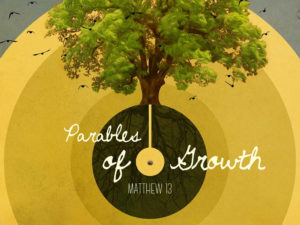New Beginnings
 In the Old Testament, the children of Israel spent about 70 years in exile. Last Sunday night, we looked at the familiar story of Daniel and how he still lived by faith while not in his homeland. When the time came for them to return to Jerusalem, the priorities for rebuilding were obvious. They needed to rebuild the city wall for defense and rebuild the temple for worship.
In the Old Testament, the children of Israel spent about 70 years in exile. Last Sunday night, we looked at the familiar story of Daniel and how he still lived by faith while not in his homeland. When the time came for them to return to Jerusalem, the priorities for rebuilding were obvious. They needed to rebuild the city wall for defense and rebuild the temple for worship.
After the foundation for the new temple was laid, the reactions of the people were very different. In Ezra 3:11-12 we read, “With praise and thanksgiving they sang to the Lord: ‘He is good; his love toward Israel endures forever.’ And all the people gave a great shout of praise to the Lord, because the foundation of the house of the Lord was laid. But many of the older priests and Levites and family heads, who had seen the former temple, wept aloud when they saw the foundation of this temple being laid, while many others shouted for joy.”
As our teachers and students are about to begin a new school year, many look at it as a time for renewal in our own lives. It’s time to fix the mistakes from last year. It’s time to build some positive new habits. It’s time for a fresh start. Whether it’s a new school year or just a time that we make a decision to change, the people in our lives will react in different ways. Some will embrace the changes while others will be more cynical. Still we know that with God’s help and the encouragement of our church family, we can continue to grow and become the salt and light He calls us to be.
Like those we read about in Ezra, let’s just keep building what God has set before us.
– Brian
The steadfast love of the Lord never ceases;
his mercies never come to an end;
they are new every morning;
great is your faithfulness.
“The Lord is my portion,” says my soul,
“therefore I will hope in him.” – Lamentations 3:22-24
The Story of Esther
 Not long ago on a Sunday evening we looked together at the story of Esther. Although God is not mentioned, we see Him at work throughout the events that occurred. To follow up with a few more ideas, I’d like to share three important themes in the story that Wes McAdams from the church of Christ on McDermott Road in Plano wrote about recently. – Brian
Not long ago on a Sunday evening we looked together at the story of Esther. Although God is not mentioned, we see Him at work throughout the events that occurred. To follow up with a few more ideas, I’d like to share three important themes in the story that Wes McAdams from the church of Christ on McDermott Road in Plano wrote about recently. – Brian
The Freedom of Forgiveness
 On Sundays, we have been studying the parables of Jesus. The parable we will talk about this Sunday illustrates the importance of forgiveness. Last year Dan Winkler released a book entitled, Forgiving, Forgiven and Free: The Peace of Living Without a Past. In the book’s preface, Michael Whitworth considers some of the reasons we have a cultural pressure not to forgive.
On Sundays, we have been studying the parables of Jesus. The parable we will talk about this Sunday illustrates the importance of forgiveness. Last year Dan Winkler released a book entitled, Forgiving, Forgiven and Free: The Peace of Living Without a Past. In the book’s preface, Michael Whitworth considers some of the reasons we have a cultural pressure not to forgive.
“Forgiveness seems thoroughly unnatural or inhuman. Americans believe in ‘justice for all’ and value law and order. Whenever I have taught and counseled on forgiveness, many people have confessed to the seeming injustice of it all. When we forgive those who have wronged us, it feels like we are letting them off the hook—that justice isn’t being done. Is forgiveness fair? Forgiveness can also feel cowardly. Isn’t it something only weak people do? It takes courage, we tell ourselves, to stand our grand and bear the standard of injustice. Letting others off the hook for their sins is giving in; it’s surrender. I’ve discovered that these twin ideas—the ‘injustice’ and ‘cowardice’ of forgiveness—are more deep-seated than we imagine. Why else would be choose to live without forgiveness? Why would we decide to live without forgiving others, without forgiving ourselves, and without God’s forgiveness so graciously offered up to us in Christ?”
I believe that part of the answer to Michael’s last question is that we do not always consider those three things to be connected. Jesus states clearly in Matthew 6:14-15 that how we forgive others is connected to how God forgives us. “For if you forgive others their trespasses, your heavenly Father will also forgive you, but if you do not forgive others their trespasses, neither will your Father forgive your trespasses. “
Forgiveness may be one of the most difficult commands of God for some of us to follow. When we buy into the cultural lie that is cowardly or unjust, it becomes even more difficult for us to do. There’s a reason that Peter’s suggestion of forgiving seven times seemed over-the-top to him. Still it is a command of God, and it is something we desire to receive from others and from Him. Let’s be people who forgive out of love for one another and because of the way He forgives us.
– Brian
Just Keep Growing
 It has been a great week here at Southwest. We’re thankful for everyone who worked on VBS in decorating, cooking, teaching, acting, games, clean up and countless other ways. It’s always a fun, tiring week, and it is encouraging each night to hear kids talk about the lessons they have learned about God and His word. Those kids will grow into adults who we pray will live out the lessons they learned this week.
It has been a great week here at Southwest. We’re thankful for everyone who worked on VBS in decorating, cooking, teaching, acting, games, clean up and countless other ways. It’s always a fun, tiring week, and it is encouraging each night to hear kids talk about the lessons they have learned about God and His word. Those kids will grow into adults who we pray will live out the lessons they learned this week.
On Wednesday, we had an excellent lesson in our summer series from my friend, Nathan Mellor. If you were working with VBS or were just unable to be here, I would encourage you to listen to the audio of his lesson on the church website. It is a great reminder of the importance of service and humility, and it fits very well with the parables we talked about on Sunday.
As we were getting ready to leave the building Wednesday, Nathan (the guest speaker) noticed that Nathan (my son) might be taller than I am. I attribute it his thicker hair, but he may actually be. David already passed me about a year ago. I’m glad they are growing, but it really took me by surprise. There are people who are even more surprised though. Friends who haven’t seen them in a while can’t believe it, because they remember the younger, smaller version of our boys. The whole thing made me think about our spiritual growth. Would people around us or those who have not seen us for a while be amazed by our growth in our walk with God? We talked about that kind of growth recently in the parables from Matthew 13.
Why I “Go” to Church
 You may cringe at the title because you know that we ARE the church, but consider this article from Timothy Gunnells, a former minister and current member of the church in East Tennessee, about why the church is important for every Christian.
You may cringe at the title because you know that we ARE the church, but consider this article from Timothy Gunnells, a former minister and current member of the church in East Tennessee, about why the church is important for every Christian.Summer So Far
 Although summer is supposed to be a time when things slow down a little, it seems like things get pretty busy some weeks. As I write this on Wednesday, our Yellow House crew is getting the pantry restocked for the monthly food giveaway day on Monday. John and a big group of our teens are midway through a great week at Pettijohn Springs Christian Camp. David and Sarah have returned from a trip visiting with churches that support our mission efforts in Haiti. Kyle is gearing up to begin his work with the Tigers for Christ College Ministry next month. Vacation Bible School registrations are coming in through the church website. (Register today at www.swcocada.com/vbs-2018.) There are so many more things I could mention, but I would like you to remember one specifically. Our Summer Series of guest speakers is underway, and the speakers are doing a tremendous job reminding us of how encountering Jesus changes lives.
Although summer is supposed to be a time when things slow down a little, it seems like things get pretty busy some weeks. As I write this on Wednesday, our Yellow House crew is getting the pantry restocked for the monthly food giveaway day on Monday. John and a big group of our teens are midway through a great week at Pettijohn Springs Christian Camp. David and Sarah have returned from a trip visiting with churches that support our mission efforts in Haiti. Kyle is gearing up to begin his work with the Tigers for Christ College Ministry next month. Vacation Bible School registrations are coming in through the church website. (Register today at www.swcocada.com/vbs-2018.) There are so many more things I could mention, but I would like you to remember one specifically. Our Summer Series of guest speakers is underway, and the speakers are doing a tremendous job reminding us of how encountering Jesus changes lives.Walking Daily With Jesus
 Our summer series got off to a great start Wednesday as we were reminded of the significance of the birth of Jesus. As we spend our summer seeing how lives were changed by encountering Him, we should acknowledge our walk with Jesus is not a once-a-week activity. It is a changed life. For many Christians, it is a struggle to translate the truths we talk about while we are together to the rest of our weeks living everyday life.
Our summer series got off to a great start Wednesday as we were reminded of the significance of the birth of Jesus. As we spend our summer seeing how lives were changed by encountering Him, we should acknowledge our walk with Jesus is not a once-a-week activity. It is a changed life. For many Christians, it is a struggle to translate the truths we talk about while we are together to the rest of our weeks living everyday life.- Busyness: Our schedules can get in the way of our study and prayer and other good things God has equipped us to do. Prioritize.
- Mobility: The ease of getting from place to place has made it more and more difficult for us to be still. Slow down and unplug sometimes.
- Debt: The desire to have can take away our ability to do good for others and replace that with worry. Money really won’t buy happiness.
- Conformity: Our culture will tell you there is a better way to live than what God asks of us. Remember who designed you.
- Security: We want so badly to be in control. God wants us to submit to Him.
- Regulation: There are rules about everything now. Regardless of those rules, we can continue following the greatest commands: love God and love people.
Don’t Ever Forget

I enjoyed this recent article by Jacob Hawk, the Preaching Minister at Faith Village Church of Christ in Wichita Falls, and I want to share it with you. Jacob will be speaking in July for our Wednesday night summer series. – Brian
This past week I was blessed to see the new movie, Paul: Apostle of Christ. Though there was theatrical longitude in writing the script, it was fairly accurate to the biblical account of Acts, and remarkably accurate to the historical account of Christian life in Rome some 30-35 years following the death of Jesus. In those days, professing the name of Christ as a “Christian”, a “follower of the Way”, wasn’t casually done for acceptance or social benefit. It was literally a statement of life or death.The actor playing the role of Paul made some wonderful statements throughout the movie, many coming directly from Scripture, but one statement really stuck with me—“We can’t ever forget what it was like to be lost, and we can’t ever forget what it was like to be found.” Such beautiful, convicting, God-honoring words. However, the statement also troubled me, because at times in my life, I’ve forgotten what it was like. Or maybe better said–I didn’t know how to remember it. Let me explain.
Prayer
 As I write this on Thursday morning, it is the National Day of Prayer. Our nation had a long history of prayer before Harry Truman signed a law in 1952 setting aside the first Thursday in May for this purpose. I know that a setting aside a specific day annually for prayer is not a mandate from scripture, but I enjoy days like this where an increasingly secular culture takes a moment to remember God. It is also a good time to think about what scripture does say about prayer and the important role it plays in our relationship with Him. Jesus teaches us quite a bit about prayer in Matthew 6:5-13.
As I write this on Thursday morning, it is the National Day of Prayer. Our nation had a long history of prayer before Harry Truman signed a law in 1952 setting aside the first Thursday in May for this purpose. I know that a setting aside a specific day annually for prayer is not a mandate from scripture, but I enjoy days like this where an increasingly secular culture takes a moment to remember God. It is also a good time to think about what scripture does say about prayer and the important role it plays in our relationship with Him. Jesus teaches us quite a bit about prayer in Matthew 6:5-13.
“And when you pray, do not be like the hypocrites, for they love to pray standing in the synagogues and on the street corners to be seen by others. Truly I tell you, they have received their reward in full. But when you pray, go into your room, close the door and pray to your Father, who is unseen. Then your Father, who sees what is done in secret, will reward you. And when you pray, do not keep on babbling like pagans, for they think they will be heard because of their many words. Do not be like them, for your Father knows what you need before you ask him.
“This, then, is how you should pray: Our Father in heaven, hallowed be your name, your kingdom come, your will be done, on earth as it is in heaven. Give us today our daily bread. And forgive us our debts, as we also have forgiven our debtors. And lead us not into temptation, but deliver us from the evil one, for yours is the kingdom and the power and the glory forever. Amen.”
What can we learn from the teaching of Jesus in Matthew 6 about how we should pray?
- Don’t pray to be seen. That kind of prayer put the focus in the wrong place and brings result that we do not want.
- Remember that God knows what you need. Prayer is not dependent on profound words or an impressive vocabulary. It is heartfelt communication with our Creator.
- Give glory to God for who He is and what He does.
- Invite God to reign in your life and in the world.
- Acknowledge that God’s will is greater than our own. We do not have all the answers or the perfect plan. He does.
- Ask God about regular, physical needs and acknowledge that the things we have are a blessing from Him. This prayer can also help us overcome worry. (Matthew 6:26)
- Ask forgiveness, and be prepared to forgive others. We should give the same level of forgiveness that we want to receive. (Matthew 18:21-22)
- Temptation is all around us. Pray that we might avoid it entirely or overcome it when we encounter it. (Matthew 26:40-41)
Now that we see a little more about how we should pray, what do we know about why we should pray?
- The kingdom, power and glory are His. He is the only one who has the power to answer and do.
- Prayer works! The answer may not always be what we expect, but God hears and does. “The prayer of a righteous person is powerful and effective.” (James 5:16)
Let’s make sure that every day is a day of prayer in our lives.
– Brian
“Be joyful in hope, patient in affliction, faithful in prayer.” – Romans 12:12
Proverbs Part 2
 If you are not here regularly on Wednesday nights or you are part of another class, you might not know that our adult auditorium class just finished discussing themes in the book of Proverbs from a study called “Practical Proverbs” by Scott Franks. The book is filled with short sayings that are long on wisdom. Wisdom is described in the Bible Knowledge Commentary as “having the ability to cope with life in a God-honoring way.” That is something we should all be striving to do. I wrote about the first half of that study several weeks ago. You can read that post by clicking here. As for the second half of the study, these are some of the big ideas that we talked about during our time together on Wednesdays.
If you are not here regularly on Wednesday nights or you are part of another class, you might not know that our adult auditorium class just finished discussing themes in the book of Proverbs from a study called “Practical Proverbs” by Scott Franks. The book is filled with short sayings that are long on wisdom. Wisdom is described in the Bible Knowledge Commentary as “having the ability to cope with life in a God-honoring way.” That is something we should all be striving to do. I wrote about the first half of that study several weeks ago. You can read that post by clicking here. As for the second half of the study, these are some of the big ideas that we talked about during our time together on Wednesdays.
Anger
There are good and bad kinds of anger. Good anger is often a reaction to injustice and motivates us to improving the situation and righting the wrong. Usually bad anger is selfish and leads to bad decisions. “A fool gives full vent to his anger, but a wise man keeps himself under control.” (Proverbs 29:11)
Quarreling
Some of us enjoy a good debate, but we can also be prone to pointless quarrels. The key to avoiding them is understanding their source and not fanning the flame once quarrels have started. “Without wood a fire goes out; without gossip a quarrel dies down.” (Proverbs 26:20)
Marriage
It may seem humorous that the discussion of marriage came on the heels of lessons about anger and quarreling, but we realize the negative impact those things can have on a relationship. Our relationships should instead be filled with respect, honor and praise. “Houses and wealth are inherited from the parents, but a prudent wife is from the Lord.” (Proverbs 19:14)
Parents & Kids
Steven Covey talks about the “law of the farm.” Farmers understand that they should only expect a harvest of what they have planted and cultivated. If we have a desired outcome for our children’s lives, we must plant those seeds and nurture them through prayer, love and discipline. “Hear, my son, your father’s instruction and do not forsake your mother’s teaching; indeed they are a graceful wreath to your head and ornaments about your neck.” (Proverbs 1:8-9).
Work
From the time man was placed in the garden, he was given a job to do. We have a need to do work, but how and why we do that work matters. We should not find our meaning in work, but it can be fulfilling. “He who works his land will have abundant food, but he who chases fantasies lacks judgment.” (Proverbs 12:11)
Balance and Contentment
– Brian

